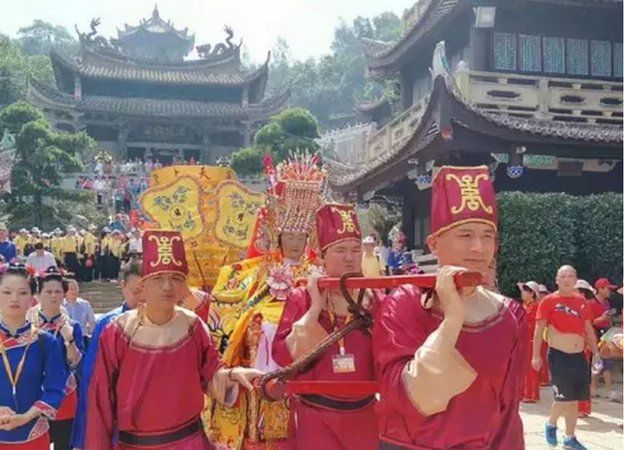Chinese deities flown on business class to Malaysia
The first was the Chinese sea goddess Mazu (also known as Matsu), widely worshipped in southern China as well as countries with large Taoist and Chinese Buddhist communities such as Malaysia, Vietnam and Taiwan.
She is a patroness of the sea and is believed to protect fishermen and sailors.
The other two statues are Qianliyan and Shunfeng'er, heavenly guardians of the goddess.
Qianliyan is known for his powers of far-sightedness while the demon Shunfeng'er possesses the incredible ability to hear all sounds carried by the wind, a role believed to aid sailors and passing ships from advancing storms.
Why were they in business class?
The three statues were sent to Malaysia and Singapore as part of an inaugural cultural exchange tour to pay tribute to the sea goddess and celebrate a festival in her name. It was organised by the Meizhou Mazu Ancestor Temple in China.
Photos being widely circulated on Chinese social media showed the statues leaving their coastal temple home and "checking in" at Xiamen Gaoqi International Airport.
"How did she get through security checks?" asked amused user Tong Huichun on the popular WeChat messaging app.
"It's normal for Mazu to give a tour. It's too far away so she's taking a flight. Taking a boat will take too long," said another WeChat user Gong Chang.
Temple staff told BBC News that the religious statues were escorted by "a delegation of more than 130 people" and brought onto a Xiamen Airlines flight heading to Kuala Lumpur International Airport.
They flew in comfort in business class, on tickets costing 2,091 yuan (£237) each.
With assistance from airline staff, devotees fastened the sacred statues into first row seats and "widened" them to allow more space.
Taking turbulence into consideration, the statues' feet were firmly fixed onto the seats with special harnesses.
"This is basic respect we have for the culture of Goddess Mazu," said a spokesperson who received the statues in Malaysia. "They were also more than 6ft high, so they had to fly business class."
They even had special passports, which staff from the temple said were a "special courtesy" provided by the airline.
Journey to the South: Where were they travelling from?
The statues came from a sacred sea temple located off the shores of Fujian province, known to its worshippers as being the birthplace of goddess Mazu.
They travelled more than 2,800km to another temple, the Thean Hou Chinese Temple in Malaysia.
Temple staff highlighted the importance of their voyage.

"This is the body of our divine goddess, a symbol of Chinese folk culture," a representative told BBC News, adding that processions were held to celebrate the statues' safe arrivals.
All three statues have made their way to neighbouring Malacca city and are on their way to Singapore. They will then return to their home in China.
[BBC SOURCES]


No comments